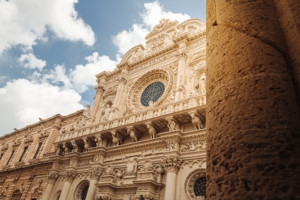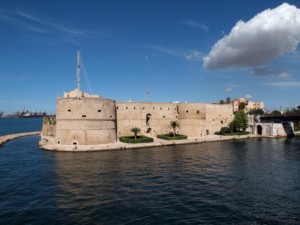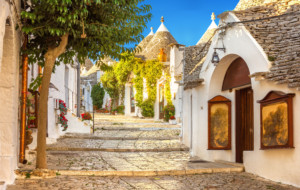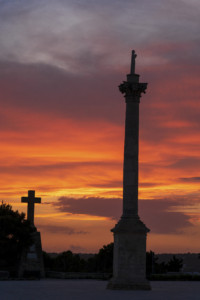Since the time of the Grand Tour, Italy has beckoned travelers to the cities of Venice, Milan, Florence, Rome, and Naples. Beyond those well-traveled cities lie less well known places, regions, and cities of incredible beauty. Such is the case of Apulia, Puglia as it is called in Italian. Archaeological finds in the region date to the First Millennium, B.C. In the centuries since then, the Greeks, Romans, Byzantines, Normans, and the Spanish all occupied these lands and the remains of those cultures represent one of the most interesting facets of what visitors find in the region.
The lovely province rises from gorgeous beaches near Taranto to the hills of central Puglia near Lecce and on to the mountainous areas further north toward Abruzzo. Those who wish to explore a little-known area of Italy, away from the crowds of tourists, should head south. Here is a short list of some of the places well worth visiting.
Lecce:
Located on the Salentina, the heel of Italy’s “boot”, this remarkable city was founded by the Romans. As you stroll through the city centen, you will find the remains of several ancient buildings. Once the Roman Empire collapsed, the Saracens, Normans, and the Byzantines all fought over this city.
The city has a certain glow to it; the local pietra leccese has lent its radiant yellow color to numerous buildings. The soft stone carves easily, and, much like Silician Baroque in style, many of the buildings in the city were built after the beginning of the 17th Century.
The city offers ease of navigation and plentiful restaurants where you can still taste original family recipes accompanied by the peppery “olio Puglese” and some incredible local wines.
Taranto:
Historic evidence indicates the Greeks, specifically immigrants from Sparta, founded the city of Taranto in the 8th Century B.C. Given the location of the port, on the western coast of the Salentina, and the relative protection of the Gulf of Taranto, the city grew in importance for both military and merchant purposes.
As with other cities in Puglia, the Romans, the Lombards, Arabs, and the Normans conquered Taranto. The local dialect, food, and architecture reflect remnants of the cultures of Greece, North Africa, and Rome.
The 6th Century Temple of Poseidon leads a list of fascinating structures in the city, as well as The Cathedral of San Cataldo (11th Century), the Castello Aragonese (15th Century) and the Palazzo del Governo (20th Century) to name only a few. Visitors will find the city quite accessible by foot. This is not a city packed with tourists, making it more enjoyable for those who visit. Plenty of small trattorias and family owned restaurants offer respite from the incessant sun – one of the reasons Italians frequent this part of Puglia during the summer Ferragosto vacation month.
Alberobello:
One of the better-known places in Puglia, Alberobello is famous for its round shaped Trulli, homes based on ancient structures built by shepherds as far back as antiquity. The lovely round buildings now house a variety of offerings including B&Bs, restaurants, and shops.
The structures fulfilled a good purpose. Their circular shape facilitated stability in any weather and, since they were built from stone without mortar, property owners could dismantle them with relative ease. Mythology in the region says locals tore down the structures when the “tax man” was coming. Property tax value then, as now, depended on the size and number of buildings. Thus, the shepherds paid less tax if the property had no buildings. The “tax man” would depart, and the locals would reconstruct the buildings, none the worse for wear.
Today, tourists flock to this lovely village. Be prepared for crowds from early June to mid-September. Given its close proximity to Bari (about an hour and a half northwest), a major airline hub, you will find the village an accessible and wonderful place to overnight as you explore this area of Puglia. A special note: The village of Locorotondo is equally famous and much less crowded in the summer months. Architecturally similar to Alberobello, the village also offers wonderful lanes to explore, great restaurants, and very comfortable accommodations.
Capo Santa Maria di Leuca:
This is the southernmost tip of the “heel” of Italy’s boot. People use words like “stunning”, “unforgettable”, and “gorgeous” to describe this incredible point of land which points to Africa and beyond. The color of the sea, the cliffs, the unique perspectives as you stroll along the paths which line the promontory provide you with your own words, your own memories.
If your schedule can facilitate time to watch the sunset from this location, please do so. You will never be disappointed.
So, as with other regions of Italy, surprises await. Puglia provides a lovely surprise, not well explored by international visitors. Wine, great food, exceptional history, and delightful people. What more could one ask of bella Italia?
Where to stay while visiting Puglia
As you explore the northern part of the region, we recommend the winery estate at Amastuola, located less than an hour from the Brindisi Airport. The resort and winery offer exceptionally fine accommodation for a reasonable price and you have at your disposal a fabulous restaurant featuring the estates award winning wine.
Masseria Amastuola Wines & Resort
SP42, 74012 Crispiano TA, Italy
✆: +39 099 990 8025
While exploring the Salentina and the south, we recommend basing your visit in Lecce at the fabulous Hotel Fiermontina. Located in the city center (parking available), this gorgeous hotel provides beautiful rooms at a very affordable price. The location provides guests with easy access to the city center. The area offers plenty of shops, stores, and restaurants. Don’t miss the delightful evening passeggiata —the traditional post-dinner gathering of neighbors to chat about the day and happenings in the city. Additionally, as the website reads, “The restaurant serves elevated interpretations of cucina povera.” The poor kitchen is so named for the poor of the region who created flavorful and healthy meals from what the land provided.
La Fiermontina
Piazzetta De Summa Scipione, 4, 73100 Lecce LE, Italy
✆: +39 0832 302481




